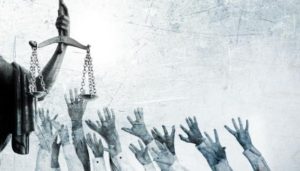Justice Needs to be Seen to be Done
 Incidents in the Spycops Inquiry show the importance of public inquiries hearing the evidence in public, writes Donal O’Driscoll.
Incidents in the Spycops Inquiry show the importance of public inquiries hearing the evidence in public, writes Donal O’Driscoll.
Behind the scenes of the Undercover Policing Inquiry, a protracted struggle is taking place to ensure the public inquiry is held, well, in public.
The current set up is prohibitively hard to access, and despite numerous representations, the Inquiry Chair, Sir John Mitting, is effectively ignoring all requests for live streaming of the evidence given by the former undercover officers.
There are many reasons why this is important, public access to the Inquiry in times of Covid not least among them. However, I’d like to draw particular attention to two incidents last week which exemplify just why live streaming of evidence is so crucial.
Currently the system for the wider public is a live transcript (on 10 minute delay) broadcast via YouTube. This effectively removes all body language, pause and tone from the evidence as the following moment illustrates.
DOUG EDWARDS’ CHANGE OF TONE
For those who were not able to see the Inquiry’s barrister questioning HN326, an undercover who went by the name Douglas Edwards, he came across as a very affable, laughing East Londoner, the sort of fellow you’d not mind meeting down the pub. Many of his answers were delivered in the same rolling manner, an old man down playing his role in events he could barely remember.
Then, at one point, the questioning touched on Special Branch’s Industrial Section. The transcript reads as follows:
Inquiry Counsel, David Barr QC, asked:
‘You talk about C Squad’s industrial desk and say that agencies and other people would contact C Squad for information. What I’m interested in is, was it public or private sector organisations, or both, which were contacting C Squad for information about industrial matters and people involved in industrial disputes and union activity?’
Douglas answered:
‘I think they’d got a good source of – surely we’re going beyond the scope of your inquiry now, aren’t we, for me to start talking about branch matters generally?’
What the transcript misses altogether, is just how dramatically his tone changed. The persona fell away as Douglas was no longer joking switched to something much harsher. The inner cop came out in a flash, and what you will not get from just reading the words, is that it was a challenge, an effort to instruct Barr not to chase that point.
As well as raising the issue of what he was so desperate to hide on a point that goes directly to the issue of illegal blacklisting, it also gave a full and proper insight into the true nature of the man giving the evidence. It was one of those moments the public really needed to see.
JOHN GRAHAM DOESN’T CRINGE
The evidence of undercover HN329 ‘John Graham’ gave a different perspective. In his statement, he noted that he had asked a woman from his target group out for dinner.
Given that John was married during his deployment, he was asked what his wife thought about it:
‘My wife has never been interested in what I did for a living, apart from the fact she knew I was a member of Special Branch. I may well have done so. She certainly knows about, as far as this Inquiry is concerned.’
Some of those following the transcript were keen to know if he cringed on being asked that, given the insight it gives to the evidence and issues around sexism. For those curious, he did not cringe, nor show remorse.
MITTING’S TONE
The third incident to highlight was the exchange between Mitting and one of the barristers for the non-police core participants, Rajiv Menon QC.
The subject matter of the exchange is well-covered in a COPS daily report. What those of us watching were able to see was the Chair’s evident anger and hostility that someone was seeking to put questions and elicit points that are of considerable importance to the non-police core participants.
It was shocking to watch and very important for us to see. It went directly to how confident the non-police core participants can be that the judge is able to address issues such as racism and sexism. The transcript alone provides none of this insight, and significant information is lost.
THE WRITE TO BE HEARD
Reading the Inquiry’s flickering live transcription for hours at a time is a test of anyone’s patience and eyeballs. The women of Police Spies Out of Lives, who represent those deceived into relationships by undercover police officers, have taken matters into their own hands and are streaming a simultaneous readalong on their YouTube channel.
It’s an inspired idea, providing a more accessible format whilst highlighting the Inquiry’s failure to do the same. Once again, it has fallen to those abused by spycops to bring the facts to the public as the authorities put obstacles in the way of public understanding.
However, as the readers are reciting words they’re seeing for the first time, though they re-humanise the blinking text they still can’t know if they’re accurately reflecting the delivery of the witness. Words alone don’t tell the story. For that, we need the Inquiry to accede to live streaming of hearings.
THE TRUTH, THE WHOLE TRUTH
There is a reason why hearings of all forms, from Parliament down to magistrates, have evidence given in person and not just in writing. It’s not only the asking of questions, but seeing and being able to judge the answers that is important.
By not live streaming, and refusing to let the wider public hear, let alone see the evidence being delivered, Mitting is preventing a vital part of the judicial process taking place – that justice needs to be seen to be done.
